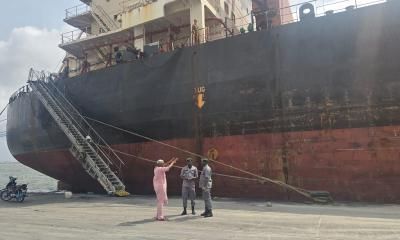Customs
Apapa Customs shuts three bonded terminals over unwholesome practices, collects N1. 378 trillion revenue in six months

Funso OLOJO / Gloria Odion
The Apapa port command of the Nigeria customs service has collected the sum of N1.378 trillion revenue in the first half of 2025.
The revenue represents a 35 percent increase above the N1.023 trillion collected within the same period in 2024, marking a N354 billion increase in revenue collection.
Making this declaration on Thursday, July 3rd, 2025, the Area Controller of the command, Comptroller Babatunde Olomu, said the half year of 2025 has been outstanding in revenue collection, trade facilitation, enhanced stakeholder engagement, deployment of technology, improvement in compliance, and uncompromising discipline.
“We surpassed our collection trajectory and revenue target, achieving laudable milestones, including the issuance of the first Single Goods Declaration (SGD) using the BODE platform on the 9th of May 2025.
“This marks a significant shift towards faster and more reliable cargo handling. We have deployed a robust platform that facilitates trade and ensures timely clearance of cargo, addressing challenges such as poor network connectivity, delays, and congestion associated with the former system” Olomu declared.
Meanwhile, Comptroller Olomu disclosed that three bonded terminals within the control of the command has been sealed for various infractions on the terms and conditions of their license.
He said one of them has even been charged to court.
Sources however whispered to our reporter that the affected terminals may have compromised on revenue returns to the command and been complicit in smuggling activities.
Olumu further declared that nine containers comprising unregistered pharmaceuticals, used clothing, expired margarine, wild animals’ skin, and codeine syrup were seized by the command during the period under review.
“These form part of the twenty-seven 27 containers seized between January and June 2025, with a duty paid value (DPV) of N9,267,443,966.00.
“The seizures include 10 containers of unregistered pharmaceuticals, two containers of codeine syrup, two containers of stolen vehicles, four containers of second-hand clothing and other sundry items.
“These seizures are part of our efforts to prevent Nigerians from consuming unwholesome foods and drugs, stop illicit trade, and protect our local industries. As a standard, we will not compromise the safety of Nigerians on the altar of trade facilitation.
“Prominent on the list of the 28 seizures made by the command during the period under review are unregistered pharmaceuticals, controlled drugs, used clothing, codeine syrup, wild animals’ skin, and other sundry items.
“It is pertinent to note that trafficking of wild animals contravene the Convention on Trade in Endangered Species (CITES), which Nigeria is a signatory to.
“Additionally, on the detention list is a container of matches imported without the required End User Certificate (EUC) as provided for in our extant laws.
Very recently, under the guidance of the CGC, we opened discussions with officials of the Nigerian Railway Corporation (NRC) and other stakeholders from various associations on developing a Standard Operating Procedure (SOP) for the movement of goods by rail from Apapa Port to other states.
These talks have shown great prospects for success, with pledges of support and anticipation for robust participation by all concerned. This effort to revive cargo movement by rail aims to decongest the port, reduce pressure on Apapa roads, and provide a viable and cost-effective cargo movement option for importers, exporters, freight forwarding practitioners, haulage operators, and licensed customs agents.
Continue Reading
Customs
Seme Customs in revenue windfall as it collects N3.5 billion in February.

Funso OLOJO,Editor
The Seme command of the Nigeria Customs Service has continued to sustain its revenue momentious
trajectory under the leadership of its Area Controller, Comptroller Wale Adenuga.
According to revenue statistics made available to our reporter by the command, it has garnered a princely sum of N3,480,970,924.67 in revenue for the month of February 2026, with the month still ongoing.
Comptroller Adenuga made this disclosure during an interactive session at a stakeholders’ engagement meeting with cross-border traders ,farmers and stakeholders organised by the Nigerian Shippers’ Council in collaboration with the ECOWAS Commission, ECOWAS Agricultural Trade Programme and GIZ International.
The event, held in Badagry on Wednesday, February 25th, 2026, was themed “Empowering Cross-Border Traders through Trade Information Desk for Agricultural Traders”.
Comptroller Adenuga noted the revenue figure represents a remarkable improvement over the N743,698,652.16 recorded in February 2025 which he attributed to the seamless trade facilitation process adopted at the Command.
“For this February that has not yet ended, we have already generated N3,480,970,924.67 as against N743,698,652.16 revenue generated in February 2025″ Adenuga told the stakeholders.
He said the feat was a reflection of
the flow of trade which he believed was getting better as people are building greater confidence in the Seme–Krake corridor.
Comptroller Adenuga assured traders and stakeholders that the significant reduction in checkpoints along the Seme–Gbaji axis is the direct result of strong collaborative efforts with other security agencies operating within the corridor.
He disclosed that only Agbara and Gbaji remain the officially Customs approved and sanctioned checkpoints along this Lagos-Abidjan corridor.
The Customs Chief further attributed the noticeable decline in crime rates along the Seme-Gbaji axis to the positive outcomes of monthly joint border security meetings involving all agencies at the border post.
These regular inter-agency engagements, according to him, have strengthened better cooperation, improved intelligence sharing and more effective responses to security challenges, thereby creating a safer and more enabling environment for cross-border trade.
Adenuga declared that while revenue generation and trade facilitation remain key priorities, the Command’s mandate extends firmly to combating illicit activities.
The CAC highlighted recent enforcement successes, including the interception of a Toyota Highlander vehicle conveying 22 packages of cocaine with an estimated street value exceeding N1 billion, a feat he claimed was made possible based on very credible information shared by the CGC.
In addition, during February 2026 alone, the Command has seized 1,000 bags of 50kg parboiled rice, underscoring its unwavering commitment to suppressing smuggling and protecting Nigeria’s economic borders.
Comptroller Adenuga reiterated the vigilance and commitment of the operatives of the Command in working closely with stakeholders, traders, farmers, sister security agencies and regional partners to improve the momentum of trade and security along the Lagos-Abidjan corridor.
Customs
Apapa Customs, Navy deepen partnership for seamless cargo movement along Apapa port corridor

Gloria Odion, Maritime Reporter
The Customs Area Controller (CAC),
Apapa Area Command, Comptroller Emmanuel Oshoba, has solicited sustained support of the Western Naval Command to ensure seamless cargo movement along the Apapa port corridor.
Comptroller Oshoba made the call on Wednesday, February 25th, 2026, while on a courtesy visit to Rear Admiral Abubakar Abdullahi Mustapha, the Flag Officer Commanding (FOC), Western Naval Command.
The visit was meant to deepen operational collaboration in line with the three policy thrusts of Consolidation, Collaboration and Innovation of the Comptroller-General of Customs, Bashir Adewale Adeniyi.
Speaking during the visit, the CAC stated: “The CGC has three key policy thrusts.
” The first is consolidation. On assuming duty, I resolved to consolidate on the gains already achieved and improve the existing relationship between Apapa Command and the Nigerian Navy within this axis.”
On collaboration, he noted that modern border management requires agencies to work in tandem, adding: “While Customs is known for trade facilitation and revenue generation, we also perform critical security functions.
“To achieve this mandate, we must collaborate with the military, the mother of security.”
On innovation, he added: “Innovation is doing things differently to achieve better results and strengthening inter-agency cooperation is part of that approach.”
He appreciated the Navy for securing Nigeria’s waters, stating: “No vessel can come into the country without safe waters.
” We commend you for keeping the maritime environment secure.”
In his response, Rear Admiral Mustapha acknowledged the longstanding partnership between both agencies, emphasizing: “Port security is about inter-agency and coordination. Without security, there is no development.”
He commended the Service under CGC Bashir Adewale Adeniyi for its performance, noting: “The Customs has done exceptionally well in blocking revenue leakages and surpassing national revenue targets.
“Continue what you are doing; with more revenue, there will be more infrastructure and social safety network for the country.”
The FOC assured the Command of improved and seamless cooperation in securing the maritime domain and supporting national economic growth.
Customs
Customs automates acquisition, renewal of licenses, permits to enhance efficiency, revenue boost.

Funso OLOJO, Editor
In order to consolidate the automation of its operations, the Nigeria Customs Service, has concluded preparations to automate the process of Licenses, Permits acquisition and renewal.
To achieve this landmark initiative, the Service has trained its bond officers of various area commands who will drive the process.
While unveiling the automation process to stakeholders in Lagos on Monday, February 23rd, 2026, the Comptroller – General of Customs, Adewale Adeniyi said the initiative was driven by the desire of the Customs management to make licenses and permits acquisition and renewal less cumbersome, promote ease of doing business and boost revenue generation.
CGC Adeniyi, who was represented by Comptroller NJ Anozie, further expanded the benefits of the automation process.
“Automation will save importers, clearing and forwarding agents the stress of acquiring or renewing their Licenses and Permits as they would be sitting in the comfort of their offices/homes to initiate and complete the process.
“Officers and men of License and Permit Unit, the bond seat unit of various Commands will also be saved some stress, as all their responsibilities would just be ‘clicks’ on the systems in front of their desks, as opposed to carrying loads of files from one table to another and from one office to the other.
“Automation will cut the cost of doing business and minimize movement risks for our stakeholders.
“They would no longer be jumping on buses or flights to and fro Customs Headquarters-Abuja, paying hotel bills plus feeding for days, to obtain or renew their licenses and permits.
“Automation will minimize, if not eradicate fraudulent practices in the system, as every single document that is uploaded in the course of this process will be automatically rejected by default, if it is fake and accepted if it is genuine.
“L&P can now view assessments through the B’Odogwu to be sure that any company applying for fresh or renewal of licences or permits is not having unpaid assessments hanging on it”
The Customs boss said he was poised to sanitize the system and urged the Licences and Permits unit of the Service to be passionate in driving this initiative.
He further disclosed that the automation process will save the importers and their agents time and money which they normally expended in manual process.
Adeniyi urged the stakeholders to take advantage of this new initiative, assuring them that they would adequately be guided on how to key into the system by the bond officers who have already been trained.
-

 Headlines2 weeks ago
Headlines2 weeks agoFIFA sends Nigeria’s Super Eagles to 2026 World Cup, awards boardroom scoreline of 3 goals to nil against DR Congo
-

 Headlines3 months ago
Headlines3 months agoMARAN pulls industry’s stakeholders to unveil its iconic book on Maritime industry.
-

 Headlines1 month ago
Headlines1 month agoAyobo residents protest deplorable road at LCDA, complain of 10- year neglect by successive local council administrations.
-

 Headlines2 months ago
Headlines2 months agoFG approves 50 percent price slash on Yuletide train services
-

 Customs3 months ago
Customs3 months agoRelief as Customs grants January 31st, 2026 extension for fast track operators to migrate to AEO
-

 Customs2 months ago
Customs2 months agoApapa Customs stretches illicit drug seizures streak with another new year interdiction of 30.1 kg of cocaine on board vessel.

